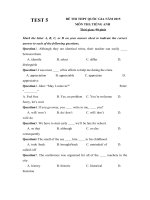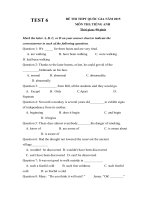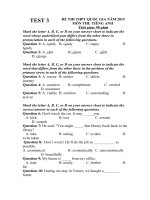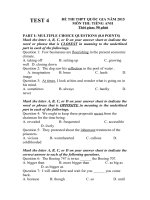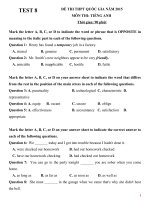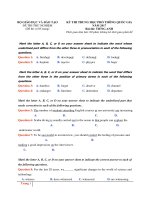đề thi thử môn anh thpt quốc gia TEST 8
Bạn đang xem bản rút gọn của tài liệu. Xem và tải ngay bản đầy đủ của tài liệu tại đây (144.24 KB, 12 trang )
TEST 8
ĐỀ THI THPT QUỐC GIA NĂM 2015
MÔN THI: TIẾNG ANH
Thời gian: 90 phút
Mark the letter A, B, C, or D to indicate the word or phrase that is OPPOSITE in
meaning to the italic part in each of the following questions.
Question 1: Henry has found a temporary job in a factory.
A. eternal B. genuine C. permanent D. satisfactory
Question 2: Mr. Smith’s new neighbors appear to be very friendly.
A. amicable B. inapplicable C. hostile D. futile
Mark the letter A, B, C, or D on your answer sheet to indicate the word that differs
from the rest in the position of the main stress in each of the following questions.
Question 3: A. punctuality B. technological C. characteristic D.
representative
Question 4: A. equip B. vacant C. secure D. oblige
Question 5: A. effectiveness B. accountancy C. satisfaction D.
appropriate
Mark the letter A, B, C, or D on your answer sheet to indicate the correct answer to
each of the following questions.
Question 6: We _______ today and I got into trouble because I hadn't done it.
A. were checked our homework B. had our homework checked
C. have our homework checking D. had checked our homework
Question 7: You can go to the party tonight _______ you are sober when you come
home.
A. as long as B. as far as C. as soon as D. as well as
Question 8: She must _______ in the garage when we came that's why she didn't hear
the bell.
1
A. have been working B. be working C. have worked D. work
Question 9: I'm sorry, but I've got _______ much work to do to come to the beach
today.
A. too B. such C. enough D. so
Question 10: It’s essential that every student _______ the exam before attending the
course.
A. passes B. would pass C. passed D. pass
Question 11: I decided to go to the library as soon as I _______.
A. would finish what I did B. finished what I did
C. finished what I was doing D. finish what I did
Question 12: Ancient Egyptians mummified the dead bodies through the use of
chemicals, _______ ancient Peruvians did through natural processes.
A. because B. whereas C. whether or not D. even though
Question 13: Please cut my hair _______ the style in this magazine.
A. the same length like B. the same length as
C. the same long like D. the same long as
Question 14: _______ in this national park declined from a few thousand to a few
hundred in ten years.
A. For a number of tigers B. The number of tigers
C. A number of tigers D. That the number of tigers
Question 15: _______, he would have been able to pass the exam.
A. Studying more B. Had he studied more
C. If he studied more D. If he were studying more
Question 16: Mark: -“_______” Helen: “Oh, thank you. I just got it yesterday.”
A. What a beautiful dress you have on!
B. How a beautiful dress you’re wearing!
C. You’ve just bought this beautiful dress, haven’t you?
D. When have you got this beautiful dress?
2
Question 17: Fire safety in family houses, _______ most fire deaths occur, is difficult.
A. how B. when C. why D. where
Question 18: _______ of the financial crisis, all they could do was hold on and hope that
things would improve.
A. In the end B. At the height C. On the top D. At the bottom
Question 19: When I got my case back, it had been damaged _______ repair.
A. over B. further C. above D. beyond
Question 20: We intend to _______ with the old system as soon as we have developed a
better one.
A. do up B. do in C. do away D. do down
Question 21: _______ that she burst into tears.
A. So angry was she B. Such her anger C. She was so anger D.
Her anger was so
Question 22: We regret to tell you that the materials you ordered are _______.
A. out of reach B. out of practice C. out of stock D. out of work
Question 23: Do you remember Daisy? I ran _______ her at the Fair yesterday.
A. by B. down C. across D. in
Question 24: – “I think we should recycle these bags. It will help protect the
environment.”
– “_______”
A. Never mind B. I can’t agree with you more
C. You can say that again D. It’s rubbish. We shouldn’t use it.
Mark the letter A, B, C or D on your answer sheet to show the underlined part that
needs correcting.
Question 25: Children’s games, which are amusements (A) involve more than one
individual, (B) appear to be (C) culturally (D)
universal.
3
Question 26: When I (A) came back I (B) realized that (C) my camera (D) had been
disappeared.
Question 27: If (A) either of you (B) take a vacation now, we (C) won’t be able (D) to
finish this work.
Question 28: Among the (A) world’s 44 (B) richest countries, (C) there has been (D) not
war since 1945.
Question 29: (A) What we know about certain diseases (B) are still not sufficient to
prevent them (C) from spreading easily (D) among the population.
Mark the letter A, B, C or D to indicate the word or phrase that is CLOSEST in
meaning to the italic part in each of the following questions.
Question 30: The lost hikers stayed alive by eating wild berries and drinking spring
water.
A. revived B. surprised C. connived D. survived
Question 31: Father has lost his job, so we’ll have to tighten our belt to avoid getting
into debt.
A. earn money B. save money C. sit still D. economize
Question 32: She was brought up in a well-off family. She can’t understand the
problems we are facing.
A. wealthy B. kind C. broke D. poor
Question 33: The Civil War in 1863 cut the United States into two nations - a southern
Confederacy and a northern Union.
(A) severed (B) acknowledged (C) integrated (D)
alienated
Question 34: Relaxation therapy teaches one not to fret over small problems .
(A) worry about (B) get angry about (C) get involved in (D)
look for
4
Read the following passage and mark the letter A, B, C, or D on your answer sheet
to indicate the correct answer to each of the questions.
The modern comic strip started out as ammunition in a newspaper war between giants
of the American press in the late nineteenth century. The first full-color comic strip
appeared in January 1894 in the New York World, owned by Joseph Pulitzer. The first
regular weekly full-color comic supplement, similar to today’s Sunday funnies, appeared
two years later, in William Randolph Hearst’s rival New York paper, the Morning
Journal.
Both were immensely popular and publishers realized that supplementing the news
with comic relief boosted the sale of papers. The Morning Journal started another feature
in 1896, the “Yellow Kid”, the first continuous comic character in the United States,
whose creator, Richard Outcault, had been lured away from the World by the ambitious
Hearst. The “Yellow Kid” was in many ways a pioneer. Its comic dialogue was the
strictly urban farce that came to characterize later strips, and it introduced the speech
balloon inside the strip, usually placed above the characters’ heads.
The first strip to incorporate all the elements of later comics was Rudolph Dirks’s
“Katzenjammer Kids”, based on Wilhelm Busch’s Max and Moritz, a European satire of
the nineteenth century. The “Kids” strip, first published in 1897, served as the prototype
for future American strips. It contained not only speech balloons, but a continuous cast of
characters, and was divided into small regular panels that did away with the larger
panoramic scenes of earlier comics.
Newspaper syndication played a major role in spreading the popularity of comic strips
throughout the country. Though weekly colored comics came first, daily black-and-white
strips were not far behind. The first appeared in the Chicago American in 1904. It was
followed by many imitators, and by 1915 black-and-white comic strips had become a
staple of daily newspapers around the country.
Question 35: In what order does the author discuss various comic strips in the
passage?
5
A. In the order in which they were created.
B. From most popular to least popular.
C. According to the newspaper in which they appeared.
D. In alphabetical order by title.
Question 36: According to the passage, the “Yellow Kid” was the first comic strip to do
all of the following EXCEPT _______.
A. feature the same character in each episode B. include dialogue inside a balloon
C. appear in a Chicago newspaper D. characterize city life in a humorous way
Question 37: The word “prototype” is closest in meaning to _______.
A. model B. story C. humor D. drawing
Question 38: The word “staple” is closest in meaning to _______.
A. new version B. huge success C. regular feature D. popular edition
Question 39: The word “incorporate” is closest in meaning to _______.
A. combine B. mention C. create D. affect
Question 40: Why does the author mention Joseph Pulitzer and William Randolph
Hearst?
A. Their comic strips are still published today.
B. They owned major competitive newspapers.
C. They established New York’s first newspaper.
D. They published comic strips about the newspaper war.
Question 41: The word “it” refers to _______.
A. balloon B. farce C. dialogue D. the “Yellow Kid”
Question 42: The passage suggests that comic strips were popular for which of the
following reasons?
A. Readers enjoyed the unusual drawings.
B. They were about real-life situations.
C. Readers could identify with the characters.
D. They provided a break from serious news stories.
6
Question 43: To say that Richard Outcault had been “lured away from” the World by
Hearst means which of the following?
A. Hearst warned Outcault not to leave the World.
B. Hearst convinced Outcault to leave the World.
C. Hearst fired Outcault from the World.
D. Hearst wanted Outcault to work for the World.
Question 44: What does the passage mainly discuss?
A. The differences between early and modern comic strips.
B. Features of early comic strips in the United States.
C. The effects of newspapers on comic strip stories.
D. A comparison of two popular comic strips.
Read the following passage and mark the letter A, B, C, or D on your answer sheet
to indicate the correct word for each of the blanks
Mobile phones emit microwave radio emissions. Researchers are questioning whether
exposure to these radio waves might (45) _______ to brain cancer. So far, the data are not
conclusive. The scientific evidence does not (46) _______ us to say with certainly that
mobile phones are categorically (47) _______. On the other hand, current research has
not yet (48) _______ clear adverse effect associated with the prolonged use of mobile
phones.
Numerous studies are now going (49) _______ in various countries. Some of the
results are contradictory but others have shown an association between mobile phone use
and cancer. (50) _______, these studies are preliminary and the issue needs further, long -
term investigation.
(51) _______ the scientific data is more definite, it is prudent for people to try not to
use mobile phone for long (52) _______ of time. Don't think that hands free phones are
any safer either. At the moment, research is in fact showing the (53) _______ and they
7
may be just as dangerous. It is also thought that young people (54) _______ bodies are
still growing may be at particular risk.
Question 45: A. cause B. bring C. produce D. lead
Question 46: A. make B. let C. able D. enable
Question 47: A. risky B. secure C. unhealthy D. safe
Question 48: A. proved B. created C. demonstrated D. caused
Question 49: A. on B. about C. through D. by
Question 50: A. While B. Though C. Additionally D. However
Question 51: A. Until B. When C. Provide D. As
Question 52: A. quantities B. periods C. amountsD. intervals
Question 53: A. way B. truth C. opposite D. fact
Question 54: A. whose B. that C. with D. as
Read the following passage and mark the letter A, B, C, or D on your answer sheet
to indicate the correct answer to each of the questions.
Butterflies are among the most extensively studied insects, an estimated 90 percent
of the world's species have scientific names. As a consequence, they are, perhaps, the
best group of insects for examining patterns of terrestrial biotic diversity and distribution.
Butterflies also have a favorable image with the general public. Hence, they are an
excellent group for communicating information on science and conservation issues such
as diversity.
Perhaps the aspect of butterfly diversity that has received the most attention over the
past century is the striking difference in species richness between tropical and temperate
regions.
For example, in 1875 one biologist pointed out the diversity of butterflies in the
Amazon when he mentioned that about 700 species were found within an hour's walk,
whereas the total number found on the British islands did not exceed 66, and the whole of
8
Europe supported only 321. This early comparison of tropical and temperate butterfly
richness has been well confirmed.
A general theory of diversity would have to predict not only this difference between
temperate and tropical zones, but also patterns within each region, and how these patterns
vary among different animal and plant groups. However, for butterflies, variation of
species richness within temperate or tropical regions, rather than between them, is poorly
understood. Indeed, comparisons of numbers of species among the Amazon basin,
tropical Asia, and Africa are still mostly "personal communication" citations, even for
vertebrates. In other words, unlike comparison between temperate and tropical areas,
these patterns are still in the documentation phase.
In documenting geographical variation in butterfly diversity, some arbitrary,
practical decisions are made. Diversity, number of species, and species richness are used
synonymously; little is known about the evenness of butterfly distribution. The New
World butterflies make up the preponderance of examples because they are the most
familiar species. It is hoped that by focusing on them, the errors generated by imperfect
and incomplete taxonomy will be minimized.
Question 55: Which aspect of butterflies does the passage mainly discuss?
A. Their physical characteristics B. Their adaptation to different habitats
C. Their names D. Their variety
Question 56: The word "consequence" in the passage is closest in meaning to
"_______".
A. requirement B. analysis C. result D. explanation
Question 57: Butterflies are a good example for communicating information about
conservation issues because they _______.
A. are found mainly in temperate climates B. have been given scientific names
C. are simple in structure D. are viewed positively by people
Question 58: The word "striking" in the passage is closest in meaning to "_______".
9
A. noticeable B. successful C. confusing D. physical
Question 59: The word “exceed” in the passage is closest in meaning to "_______".
A. allow B. go beyond C. come close to D. locate
Question 60: All of the followings are mentioned as being important parts of a
general theory of diversity EXCEPT _______.
A. differences between temperate and tropical zones
B. variation of patterns of distribution of species among different animals and plants
C. patterns of distribution of species in each region
D. migration among temperate and tropical zones
Question 61: The author mentions "tropical Asia" in the passage as an example of a
location where _______.
A. a general theory of butterfly diversity has not yet been firmly established
B. butterflies are affected by human populations
C. butterfly behavior varies with climate
D. documenting plant species is more difficult than documenting butterfly species
Question 62: Which of the following is NOT well understood by biologists?
A. European butterfly habitats
B. Comparisons of behavior patterns of butterflies and certain animal groups
C. Differences in species richness within a temperate or a tropical region
D. Differences in species richness between temperate and tropical regions
Question 63: The idea "little is known about the evenness of butterfly distribution" is
that _______.
A. there are many other things that we don't know about butterfly evenness distribution
B. we don't know anything about butterfly evenness distribution
C. we know much about butterfly evenness distribution
D. we know about butterfly evenness distribution to some extent
Question 64: The word "generated" in the passage is closest in meaning to
"_______".
10
A. assisted B. estimated C. requested D. caused
WRITING: Finish each of the following sentences in such a way that it means the
same as the sentence printed before it
1. We can’t afford to buy the car.
The car
2. His parents made him study hard for the exams.
He was
3. We started cooking for the party four hours ago.
We have
4. He has never behaved so violent before.
He is behaving
5. We couldn’t get nearer because of the police.
The police ……………………………………………………….
TOPIC: What was your favorite subject at school? Describe it and explain why this
subject was your favorite one
THE END
KEY
1 C 21 A 40 B 60 D
2 C 22 C 41 D 61 A
3 C 23 C 42 B 62 D
4 A 24 B 43 D 63 A
5 C 25 A 44 C 64 D
6 B 26 D 45 B
7 A 27 B 46 D
8 A 28 D 47 D
9 A 29 B 48 A
10 D 30 D 49 A
11 C 31 D 50 D
12 B 32 A 51 A
13 B 33 A 52 B
11
14 B 34 A 53 C
15 D 35 A 54 A
16 A 36 C 55 D
17 D 37 A 56 A
18 B 38 C 57 D
19 D 39 A 58 A
20 C 59 B
1. The car is too expensive for me to buy
2. He was made to study hard for the exams
3. We have been cooking for the party for four hours
4. He is behaving more violently than ever before
5. The police prevented us from getting nearer
12
